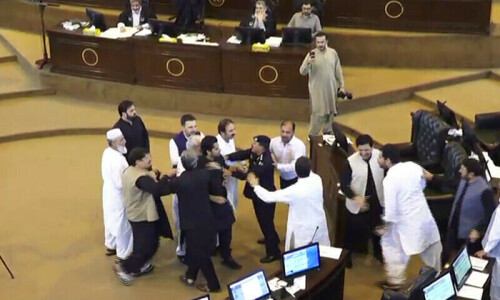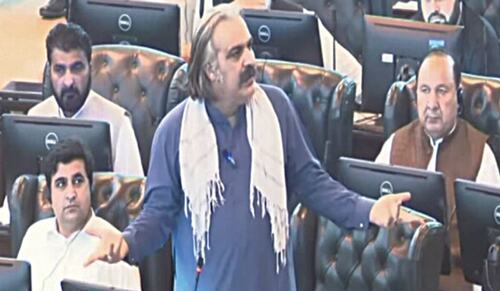PESHAWAR: In a sudden volte-face, the Khyber Pakhtunkhwa government on Monday withdrew the recently-tabled KP Police (Amendment) Bill, 2024, and instead passed a diluted version of it immediately after its presentation.
The amendment bill, aimed at clipping the widespread powers vested in the provincial police chief, was introduced in the assembly on Oct 17 after approval by the provincial cabinet.
However, a motion for its withdrawal was tabled by law and parliamentary affairs minister Aftab Alam Afridi in Monday’s session.
MPA Akbar Ayub later laid another bill on the matter that was unanimously passed by the house without any debate.
Govt earlier withdrew drastic changes to police law
In the adopted KP Police (Amendment) Bill, 2024, the government has backed off from the making drastic amendments to the police law, which for many years, the ruling Pakistan Tehreek-i-Insaf and its leadership had touted as its crowning achievement for giving operational autonomy to the police department in the province.
The role, assigned to the home and tribal affairs in the previous draft, is no more there, but the police department will have to work under the “policy, oversight and guidance” given by the chief minister. Similarly, the police chief can transfer and post officers in BPS-18 and above with the consent of the chief minister.
In addition, the government has given up on the establishment of the KP Independent Police Complaints Authority and instead reverted to the Public Safety Commission and Regional Complaints Authority, which was part of the original draft legislation.
Through an amendment to Section 9, which deals with the powers of the chief minister, a new sub-section 4 will be inserted declaring, “Any direction given by the chief minister in matters related to law and order shall be complied forthwith.”
Also, Section 11 of the original Act, which entrusted the administration of the police department to the provincial police officer, has been substituted.
“The administration of police in the province shall vest in the Provincial Police Officer, who shall exercise such operational and administrative powers subject to policy, oversight and guidance given by the Chief Minister,” reads the newly-inserted Section 11.
In Section 17 of the act, which deals with the powers of the police chief, the government has added a provision, which now requires the chief minister’s approval for the transfers and postings of the officers in BPS-18 and above.
The new provisio, “Provided that the posting and transfer of BPS-18 and above officers shall be made with the approval of the Chief Minister,” has been inserted in sub-section 4 of Section 17.
Similarly, through an amendment to the sub-section 6 of Section 17, the police chief will now prepare an annual policing plan, subject to the approval of the government. In the original act, the government approval was not required for the purpose.
Through an amendment in Section 7(4) of the original, the government could now directly recruit officers in the rank of the deputy superintendent of police, which shall not exceed five per cent of the total posts in that cadre. The word “whenever need arises” which was part of the original act has now been deleted.
Sections 21, 24 and 37 of the original Act, which had empowered the police chief with the posting and transfer of the capital city police officer, district police officers, premature transfer of DPOs and postings to police training schools, have been deleted.
Through amendments to Section 48, which provides for setting up provincial public safety and police complaints commissions, the government had tried to address the lacunas in the original bill, which had prevented the setting up of these accountability bodies over the last seven years.
Under these changes, the provincial commission will now have 15 members instead of 13 and now it shall consist seven members of the provincial assembly nominated by the speaker and including four members including one female from treasury benches to be nominated in consultation with the leader of the house and the other three from opposition benches to be nominated in consultation with the leader of opposition.
Besides the provincial advocate general, an ex-officio member, seven independents will also be nominated by the government.
In addition, through amendments to Section 67, the regional police complaint authorities would be made functional. Section 140 of the act, which had empowered the police to make rules, has now been substituted with another that reverted that power back to the government.
Earlier, lawmaker of the opposition PPP Ahmad Karim Kundi told the house that the passed amendment bill had ensure greater oversight of the police department by the assembly, besides strengthening the public safety commission.
He said the state would exercise its powers through the chosen representatives.
“We will achieve the desired objectives only when we oversee police,” he said, adding that two members would monitor the police’s policy board.
Mr Kundi said that the chairman of the public safety commission would be named by the speaker.
“We intentionally did not give any political representation in the regional complaint offices of the police,” he said.
The house later passed the KP Employees of Transport Department Regularisation of Services Repeal Bill, 2024, which was tabled by law and parliamentary affairs minister Aftab Alam Afridi.
Livestock minister Fazal Hakim Khan introduced the KP Zoonotic Diseases Control Bill, 2024, and KP Animal Feed Stuff and Compound Feed Bill, 2024, while adviser to the chief minister for culture and tourism Zahid Chanzeb tabled the KP Government Rest Houses and Tourism Properties Development, Management and Regulations Amendment Bill, 2024.
Two other proposed laws, including KP Land use and Building Control Bill, 2024, and KP Establishment of District Advisory Development Committee Amendment Bill, 2024, were also laid before the house by local government minister Arshad Ayub Khan.
Published in Dawn, October 22nd, 2024













































Dear visitor, the comments section is undergoing an overhaul and will return soon.